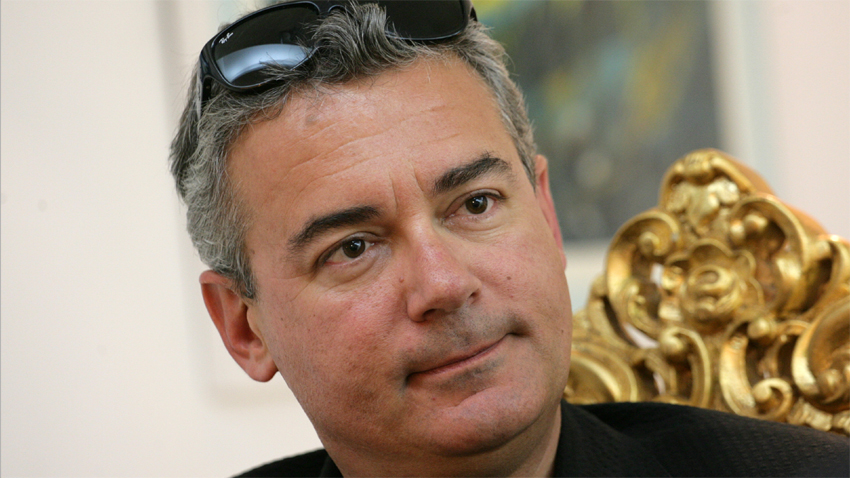Choosing a side and the consequences of this decision lead to a fateful meeting between an opponent of the communist regime and a senior State Security officer and to a battle that seemingly had ended, but actually continues to this day. The new novel by Iliya Troyanov entitled "Power and Resistance" takes us to a past that is not gone yet and continues to be seen in the hierarchy of human relationships and in the primordial battle of good and evil.
Iliya Troyanov has devoted twenty years of his life to write his new novel. The writer was a child who together with his parents fled from communist Bulgaria and became a political refugee. He has read hundreds of archival pages, talked to inmates and officers of the repressive regime. He created his work slowly and methodically guided by the belief that the great social crisis in Eastern Europe had been caused by the crimes of the communist past, now turned into taboo. The writer has toured Bulgaria to find out about various human fates.
 “Oppressed Bulgarians do not see themselves as victims but as people who have fought in a battle, which they have not completely won. They have defended the ethics, morality, and the beliefs of a free Bulgaria,” Iliya Troyanov says. “Their torturers do not see themselves as evil executioners but they have designed a whole program to explain why what they did was necessary. It is extremely important, however, to know that people in the resistance were not helpless, because we tend to believe that they had no chance to survive in a dictatorship. The real threat to the communist system was exactly the fact that they showed such courage and that they were ready to die for their beliefs.”
“Oppressed Bulgarians do not see themselves as victims but as people who have fought in a battle, which they have not completely won. They have defended the ethics, morality, and the beliefs of a free Bulgaria,” Iliya Troyanov says. “Their torturers do not see themselves as evil executioners but they have designed a whole program to explain why what they did was necessary. It is extremely important, however, to know that people in the resistance were not helpless, because we tend to believe that they had no chance to survive in a dictatorship. The real threat to the communist system was exactly the fact that they showed such courage and that they were ready to die for their beliefs.”
In his novel Iliya Troyanov juxtaposes dissident Constantine, tortured for weeks by the State Security after trying to blow up a monument to Stalin, and his former classmate Methodi, who made a career as an officer of the repressive apparatus.
“Some of the people who spent years and even decades in prisons and camps, each contributed to the image of Constantine. The other character Methodi – a State Security officer and a member of the Central Committee of the Communist Party, who after the changes in 1989, just like many others became a businessman, is also influenced by people with whom I have spoken to, and their memoirs. One of the sad facts is that in modern Bulgaria one can find luxurious editions of memoirs by a number of senior officers of the State Security and political figures of the Communist Party, but there are few works by people who spent time in jail during the regime,” the writer says.
According to Iliya Troyanov, there is a great danger that one day students would read in history textbooks that dictator Todor Zhivkov was a just ruler, and this would be because of the refusal of Bulgaria’s political elite to revise the communist past and to tell the truth to the young. That is why Troyanov’s novel has historical importance. “Literature enables me to blend documentary facts with fiction and philosophy and to describe a 50-year period of communism and post-communism, showing that the years before 1989 affected the period after that,” the writer says.
“In Eastern European countries where the communist past was more critically discussed and disclosed one can fewer oligarchic structures and fewer mafia networks preserved from communism,” Iliya Troyanov adds. “Indeed, societies that reviewed and disclosed their past enjoy more freedom and justice these days. Can you imagine for example, what power fascists and Nazis in Germany would have if there was not a 60-year- long comprehensive review of the criminal system. ‘Unless we learn from history, we are destined to repeat it,’ William Faulkner once wrote.”
English: Alexander Markov
The Bulgarian Minister of Culture Marian Bachev and Vice President of Bulgaria Iliana Iotova opened the Bulgarian stand at the world-famous London Book Fair – 2025. Bulgaria’s second consecutive participation in the prestigious forum is being carried..
Bulgarian women artists in Chicago are preparing their fifth annual exhibition entitled "Ladies Turn". The opening is scheduled for 23 March at 832 Lee St, Des Plaines, IL, United States, Illinois 60016. The event is organised by the "Little Bulgaria"..
On March 8, Seojun Kim from South Korea, the winner of the first prize in the men's category at the 2024 International Ballet Competition "Sara-Nora Prima", will perform on the stage of the Stara Zagora State Opera . He will play Prince Désiré..
The Bulgarian Minister of Culture Marian Bachev and Vice President of Bulgaria Iliana Iotova opened the Bulgarian stand at the world-famous London Book..

+359 2 9336 661
